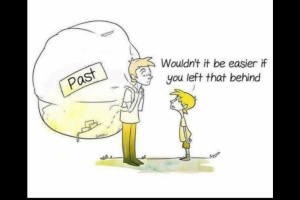Stress. An all too familiar word for most of us. It seems like the majority of people you meet on any given day are experiencing a detrimental amount of stress. What is stress doing to the body and mind? It must be having an effect, right? Let’s get into it.
Before we can discuss what stress is doing to you, let’s begin by defining what it is. To put it simply, stress is a response. A response based on your perception of the world. This response may not be based on reality, but rather, your internal reality. As I define it, there are two types of stress: Old and New.
Old-stress is the textbook definition of a ‘fight or flight’ state. Imagine this: There you are, out in the savannah forging for food, when you hear a twig snap, and notice a lion racing towards you. Your body immediately goes into a sympathetic (fight or flight) state, blood is diverted to your muscles, and you go into all-out survival mode. Hopefully you survive (I’m rooting for you!), and as you recognize that you are no longer in danger, your nervous system shifts back into a balanced state between sympathetic and parasympathetic (rest and digest state). This is how the process of stress has worked for nearly the entirety of existence of life on this earth.
These days however, there is a new type of stress on the block. New-stress is stress derived from a non-lethal source. This includes sources such as financial stress, relationship stress, fear of being judged, public speaking, starting a business, driving in traffic, God-forbid we lose followers on social media, and many others. The detrimental aspect of new-stress is that, for many of us, it is always present. Unlike old-stress with its occasional (and brief) spike of stress, most people are experiencing new-stress every waking hour of the day (and some of us even while we sleep!).
Remember this:You have a two-million year-old brain that has one job: Survival. It’s designed to keep you safe, remain in your comfort zone, and loves routine. Sounds ‘great’, right? The problem is that since, at least in the Westernized nations, the majority of your stress has less to do with the danger of the thing/experience, and more to do with your perception of the experience, you may hold yourself back from the happy, healthy, and successful life you could be living.
Remember this:Your brain keeps you alive. That’s its job. Happiness is your job. You need to create the life that you are looking for by pushing past your comfort zone, and into a place that leads to the growth you desire.
Here is a typical situation behind the old-stress response:
- Perceived stressor
- Hypothalamus/Pituitary/Adrenal (HPA) Axis activates to prepare the body for the experience and take action. Cortisol and other stress hormones released.
- Fight or Flight Ensues
- Once out of perceived danger, normalcy resumes
Here is what happens with the chronic new-stress response:
- Perceived stressor
- Hypothalamus/Pituitary/Adrenal (HPA) Axis activates to prepare the body for the experience and take action
- Fight or Flight Ensues
- Our perception continues to perceive various stressful events
- HPA axis continues working
- Overtime we arrive at a chronic state of stress where the HPA axis becomes dysregulated due to overuse, and we release a higher amount of cortisol at baseline, regardless of the time of day.
- Chronic inflammation ensues
- Emerging symptoms such as:
- Fatigue
- Weight gain
- Trouble sleeping
- Brain fog
- Low libido
- Anxiety and depression
- Elevated blood sugar
- Immune Suppression
Any of these sound familiar?
- And the cycle feeds on itself as the person’s health continues to deteriorate.
So, you may be asking, “what can I do to help with my stress?”
I’m glad you asked.
Here are three simple strategies you can use today to decrease your stress and live a healthier life:
- Breathing:
One of the most powerful forms of healing known to man is BREATHING. Sounds simple, doesn’t it? As simple as it is, far too many of us don’t do it correctly for proper relaxation.
I know what you’re thinking. “What??? How am I not breathing correctly?”
Just hear me out, give what I suggest a try, and judge for yourself.
Most of us breath from our chest. By this I mean that we mostly engage the upper lobes of the lungs, and don’t fully fill the lower lobes. Couple this with the fact that most people, when stressed, typically hold their breath. This means that, in the hectic, always on the move society that we live in, people are usually either chest-breathing or holding their breath. Here comes the secret: Diaphragmatic Breathing. This means that when you take a breath, your lower abdomen comes out, while your chest remains relatively still.
Why is this helpful?
Breathing in this way causes relaxation because it stimulates a nerve in the body called the vagus nerve. This nerve is responsible for the REST and DIGEST portion of your nervous system (also called the parasympathetic nervous system). This is the state your body needs to be in in order to heal and recover from illness and disease. When your body is in a stressful state the FIGHT or FLIGHT system (called the sympathetic nervous system) activates, and your immune system takes a momentary dive. During this state, the body is in survival mode, and running away from a lion is far more important than making sure the immune system is properly functioning. However, when this state is ‘always’ engaged, the immune system is continuously suppressed. Try it for yourself, put one hand on your abdomen, take a deep breath in through your nose for 4 seconds, making sure your abdomen expands while you breathe, and then exhale through nose for 4 seconds. Try closing your eyes and playing music to deepen the experience. Repeat this process for as long as you’d like, as often as you’d like, and watch your mental and physical health begin to improve!
2. First Things First:
Every night before bed write out a list of 3 tasks (can max out at 5) that must get done tomorrow. These are the non-negotiables. The tasks that you tell yourself, “if by the time I go to bed the tasks on my list are complete, I had an amazingly productive day.”
Keep this list by your bed, and review it upon waking. Take a few minutes and visualize yourself completing each task. Your brain doesn’t know the difference between what you have actually experienced, and what you imagine to be true. To put it simply, they’re both stored in the same way. Undergoing this process primes your brain for the day, as well as increases your confidence that it will get done because you’ve ‘already done it before.’
Begin tackling your list as soon as possible. Be sure to be laser focused on your list, and assign as much time as necessary to completing each task. For most people, stress increases because we have a million things to do on our list, and we say “yes” to everybody else, effectively saying “no” to ourselves, and the things that matter most to us, the things that we need to get done, don’t get accomplished. Then the process repeats, only now, there are more things we need to do!
Take a few moments before bed to review your list. Congratulate and acknowledge yourself for the tasks you completed, and have compassion for yourself for those that were not completed. Tomorrow is a new day. Then repeat the process by creating tomorrow’s list. Remember, keep your list to 3-5 tasks MAX.
3. Share your struggle, and ask for help when needed:
Far too many of us believe that our stressors are our burdens to carry, and that we must face them alone. For many, the idea of asking for help, or simply externalizing our feelings, can be seen as a sign of weakness. I implore you to see things from a different perspective. Sharing your feelings, and asking for help are signs of strength, security in who you are, and emotional intelligence. Very often the people closest to you have no idea how stressed you are, because you do your best to hold it inside, and pretend that everything is perfectly alright. These people are often able and willing to help you, if they only knew you needed it. Sometimes the best help is the gift of listening. Simply being able to verbalize your emotions, and talk your thoughts aloud while in another person’s presence, can make you feel as if the weight of the world has been lifted off of your shoulders. You’re not in this alone. Your loved ones love you. Remember that, and open up to them when you could use some support.
I know that these three strategies will serve you going forward, and I wish you continued health, happiness, and success on your journey.
All my love,
Your Coach – Dr. Jamil
P.S. Whenever you’re ready to continue your transformation, here are a couple of ways I can help you create the life you dream of:
Download a FREE copy of my book ‘20 Steps To Your Next Breakthrough” by CLICKING HERE. This book will give you the mindsets and strategies needed to dramatically increase your momemtum towards your goals and dreams. You can also get the Audiobook version by CLICKING HERE.
Apply to work with me directly: If you’re a leader and a high performer who wants to create an extraordinary life without regret, and you want a coaching experience completely customized and tailored for you and your needs, then CLICK HERE to begin a conversation with me. See some of the results my clients have experienced by CLICKING HERE.
About Dr. Jamil Sayegh
Dr. Jamil Sayegh is an international transformation coach and strategist, integrative naturopathic physician, and the author of 20 Steps to Your Next Breakthrough. He is the only naturopathic physician famous for working with leaders and top performers to help them accomplish their goals and live extraordinary lives without regret. His proprietary, simple 3 Step system delivers the mindsets, skill-sets, and strategies needed to obtain vibrant health, passionate relationships, massive success, and lasting fulfillment – guaranteed.
He has a deep passion to end suffering for as many people as possible by reconnecting them to what’s real, and challenging them to live and love fully. For almost two decades his enthusiasm, thirst for knowledge, and desire to serve, has led him on an incredible journey of self-discovery and spiritual peace, allowing him to powerfully serve clients from all walks of life. He is a true healer at heart who loves to motivate, empower, and inspire others to take responsibility and action in their lives.






